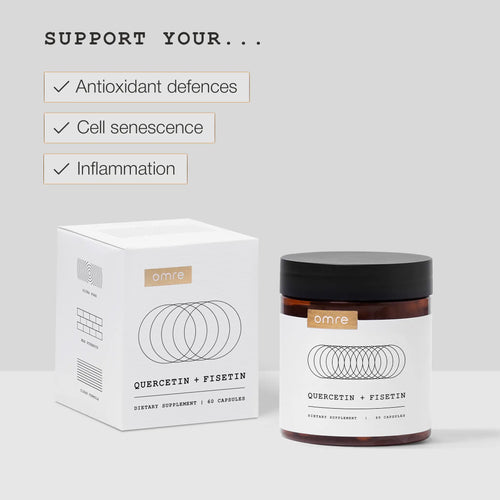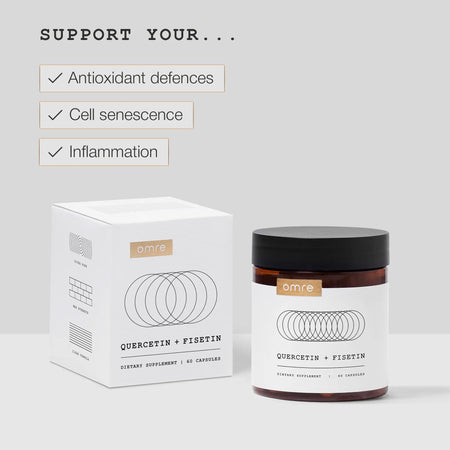Table of Contents
- Key Takeaways
- What Are the Main Differences Between Fisetin and Quercetin?
- What is Fisetin?
- What Are The Potential Benefits of Fisetin?
- Are There Any Side Effects of Fisetin?
- What is Quercetin?
- What Are The Potential Benefits of Quercetin?
- Are There Any Side Effects of Quercetin?
- Dosage and Supplementation of Fisetin and Quercetin
- Do Fisetin and Quercetin Clear Senescent Cells?
- Can You Use Fisetin and Quercetin Together?
- Fisetin vs Quercetin: Which One Is Better?
- Conclusion
- FAQs
Fisetin and quercetin are two powerful plant-based compounds with similar antioxidant effects, but they’re not interchangeable.
Fisetin is known for clearing aging “zombie” cells, while quercetin shines in fighting inflammation and supporting the immune system. If you’re trying to decide between the two, this comparison will help you choose based on your goals.
Quercetin and Fisetin help manage 'zombie' senescent cell burden and support cellular rejuvenation.*Quercetin + Fisetin
Key Takeaways:
Fisetin clears senescent cells linked to aging and may support brain health and longevity.
Quercetin reduces inflammation and is commonly used for allergies, immunity, and heart health.
Fisetin works best in short high-dose cycles, while quercetin is better suited for daily use.
Taking them together may offer stronger anti-aging effects than using either one alone.
What Are the Main Differences Between Fisetin and Quercetin?
 Fisetin is more effective at clearing senescent cells, while quercetin is better known for reducing inflammation and supporting the immune system.
Fisetin is more effective at clearing senescent cells, while quercetin is better known for reducing inflammation and supporting the immune system.
Both are antioxidant-rich flavonoids found in fruits and vegetables, but they serve different roles when it comes to aging, immunity, and overall health.
Now let’s break down each difference in a bit more detail:
Natural Sources and Availability
Fisetin is most abundant in strawberries but also found in apples, grapes, and some vegetables. Quercetin, on the other hand, is more widely available in common foods like onions, apples, citrus fruits, berries, and leafy greens.
Both are easy to find in supplement form, though quercetin appears more often in mainstream products due to broader awareness.
Antioxidant and Anti-Inflammatory Properties
Both fisetin and quercetin help fight oxidative stress.
But when it comes to inflammation, quercetin takes the lead. It’s been studied for its role in calming the immune response, especially in allergies and chronic inflammatory conditions.
Fisetin’s antioxidant powers are tied more to cellular health and neuroprotection, particularly in aging brains.
Senolytic Activity and Longevity Support
Fisetin is considered one of the most effective natural senolytics. It helps remove senescent cells, which are aged, non-functioning cells that can speed up aging and disease.
Quercetin also has senolytic properties, but fisetin is stronger in this role and is often used in longevity-focused protocols.
Absorption and Bioavailability
Fisetin has very poor bioavailability, meaning it’s harder for the body to absorb and use. Quercetin isn’t great either, but it fares a bit better.
To get the most from fisetin, it may need to be combined with fats, taken with other absorption aids (like BioPerine), or used in higher doses.
Supplementation Style
Fisetin is often used in “pulse doses”, meaning large amounts taken for a few days per month. This aligns with its senolytic role.
Quercetin works better as a daily supplement, especially for long-term inflammation or allergy relief.
What is Fisetin?
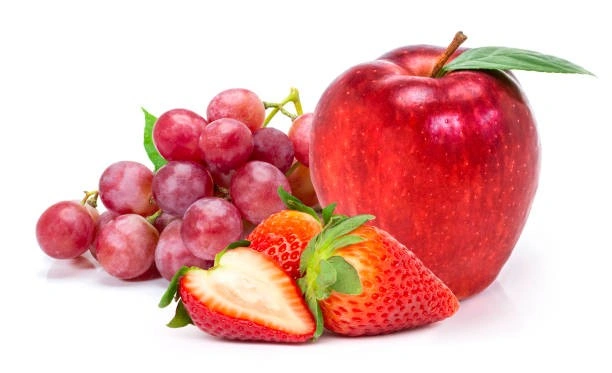 Fisetin is a naturally occurring flavonoid found in fruits like strawberries, apples, and grapes, as well as in vegetables like onions. This antioxidant has been making waves for its potential health benefits, especially in the areas of brain health, aging, and inflammation.
Fisetin is a naturally occurring flavonoid found in fruits like strawberries, apples, and grapes, as well as in vegetables like onions. This antioxidant has been making waves for its potential health benefits, especially in the areas of brain health, aging, and inflammation.
While it doesn’t have the same level of recognition as other flavonoids, like Quercetin, Fisetin might offer some unique advantages, particularly when it comes to supporting longevity and cellular health.
What Are The Potential Benefits of Fisetin?
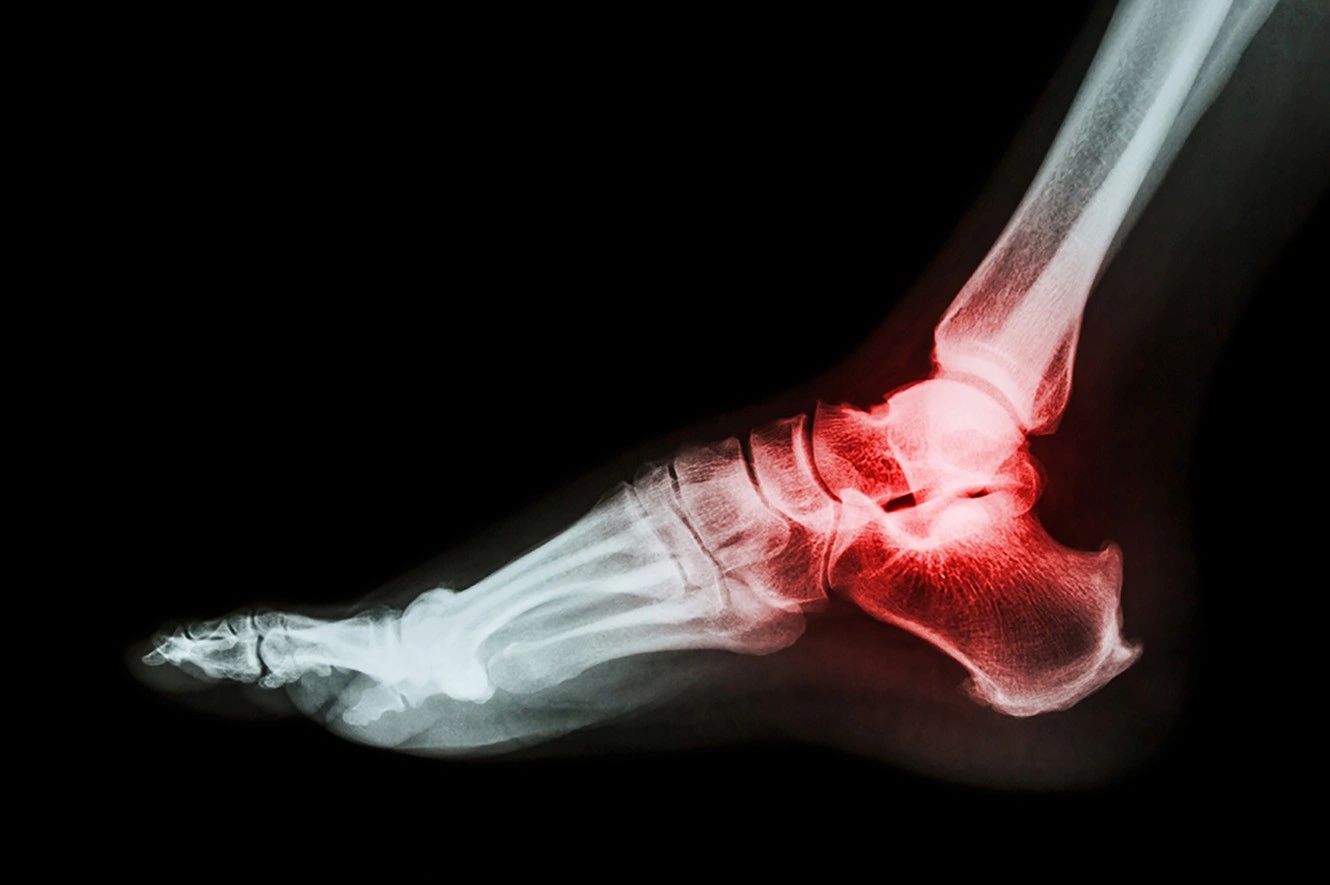 Fisetin may have a range of positive effects on the body, and while more research is needed, early studies show some interesting findings.
Fisetin may have a range of positive effects on the body, and while more research is needed, early studies show some interesting findings.
Supports Brain Health
Fisetin might help support brain function and memory by acting as a neuroprotective agent. A study published in The Journal of Nutritional Biochemistry found that Fisetin could enhance cognitive function in aging mice, which will be an interesting avenue of research in future human trials (1).
May Help Combat Inflammation
Fisetin has anti-inflammatory properties that may help reduce inflammation in the body. Research indicates that it could play a role in managing chronic conditions linked to inflammation, such as arthritis and cardiovascular disease (2).
Antioxidant Protection
As an antioxidant, Fisetin could help neutralize free radicals in the body, potentially reducing oxidative stress and supporting healthy aging. A study highlighted Fisetin's role in protecting cells from oxidative damage, which is a key contributor to aging and disease (3).
Potential Cancer-Fighting Properties
Fisetin might have some promise in the fight against cancer. Early research has shown that Fisetin can inhibit the growth of cancer cells in vitro (performed in a lab on individual cells). A study highlighted its potential as an anticancer agent, particularly in breast and colon cancer cells (4). It’s important to highlight that so far it has only been tested on individual cells in a lab, which does not mean it will work in humans.
Are There Any Side Effects of Fisetin?
While Fisetin is generally considered safe, it’s important to be aware of potential side effects, especially if consumed in large amounts. Though rare, some individuals may experience mild reactions.
Digestive Issues: Some people may experience mild digestive discomfort, like bloating or gas. Even in higher doses, it was generally well-tolerated, but individual reactions can vary.
Allergic Reactions: As with any supplement, some individuals may have allergic reactions. However, these are extremely rare, and there is limited evidence linking Fisetin to allergic responses.
Drug Interactions: Fisetin may interact with certain medications, particularly those that affect blood clotting, such as anticoagulants. It’s advised to consult a healthcare provider if you’re on such medications before taking Fisetin.
What is Quercetin?
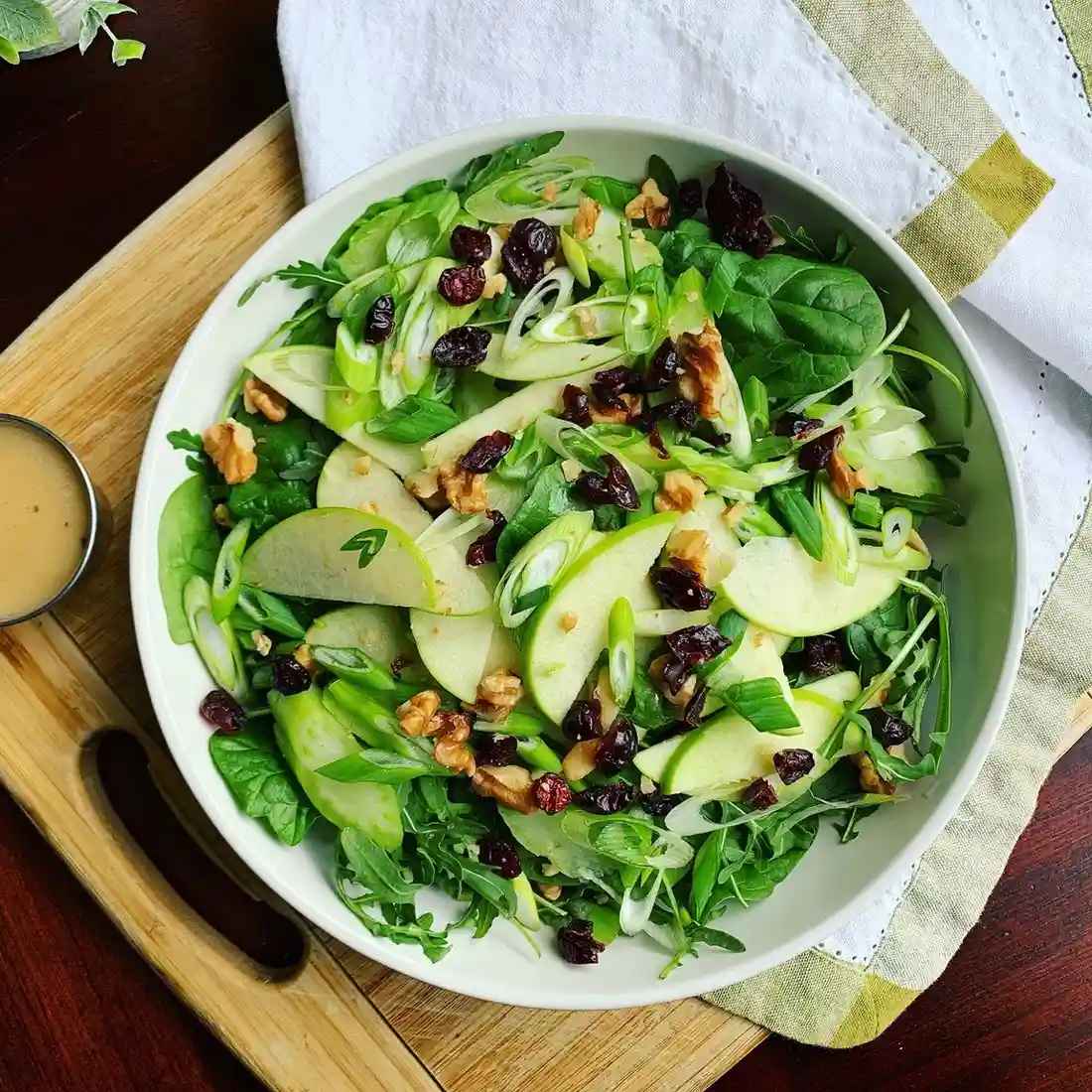 Quercetin, another flavonoid, is found in foods like apples, onions, berries, and leafy greens. Like Fisetin, Quercetin is known for its antioxidant and anti-inflammatory properties.
Quercetin, another flavonoid, is found in foods like apples, onions, berries, and leafy greens. Like Fisetin, Quercetin is known for its antioxidant and anti-inflammatory properties.
It’s particularly famous for its potential to support immune health and manage chronic conditions, and it has a long history of use in traditional medicine. More recently, it’s gained popularity as a supplement for those looking to improve overall well-being.
What Are The Potential Benefits of Quercetin?
 Quercetin might offer a range of benefits, with studies showing promising results, although further research is needed.
Quercetin might offer a range of benefits, with studies showing promising results, although further research is needed.
Supports Immune Function
Quercetin may help support the immune system by reducing inflammation and oxidative stress. A study found that Quercetin has the potential to enhance immune responses, particularly during viral infections (5).
Antioxidant Protection
As a powerful antioxidant, Quercetin might help neutralize harmful free radicals in the body, potentially lowering the risk of diseases related to oxidative stress. Quercetin helps protect cells from oxidative damage, which is associated with aging and chronic disease (6).
Reduces Inflammation
Quercetin may have anti-inflammatory effects that could help manage conditions like arthritis and other inflammatory diseases. Quercetin showed promise in reducing markers of inflammation in the body, which could be beneficial for people with inflammatory disorders (7).
Cardiovascular Support
Quercetin might support heart health by improving blood vessel function and reducing blood pressure. Quercetin supplementation may help lower systolic blood pressure, offering a potential natural remedy for cardiovascular health (8).
Quercetin + Fisetin
Quercetin and Fisetin help manage 'zombie' senescent cell burden and support cellular rejuvenation.*
Are There Any Side Effects of Quercetin?
Quercetin is generally well-tolerated, but there can be some mild side effects, particularly if taken in large amounts.
Digestive Issues: Some people might experience mild digestive discomfort, such as nausea or upset stomach. Quercetin is safe in most cases, though some people may be sensitive to higher doses.
Headaches: Headaches may occur in some individuals, especially if taking Quercetin with other supplements. While this side effect is rare, it has been noted in a few studies.
- Blood Pressure Effects: Although Quercetin may help lower blood pressure, individuals already taking blood pressure medication should be cautious, as it may cause an additive effect. A study in The Journal of Clinical Hypertension advised monitoring blood pressure when supplementing with Quercetin (9).
Dosage and Supplementation of Fisetin and Quercetin
Knowing the right dosage for Fisetin and Quercetin is important to get the most out of these supplements. Here's how to approach supplementation for both.
Fisetin Dosage
The typical dosage of Fisetin ranges from 100 to 500 mg per day. Start with lower doses and gradually increase based on your body’s response.
Some studies suggest higher doses for specific benefits, but it’s always wise to check with a healthcare professional before starting a new supplement regimen (10).
Quercetin Dosage
For Quercetin, a standard dose is around 500 to 1000 mg per day, usually divided into two doses.
Some studies suggest that higher doses can be effective, especially when managing inflammation or supporting heart health, but like with Fisetin, start low and adjust as needed (11).
Supplementation Tips
Both Fisetin and Quercetin should ideally be taken with meals, as this can help improve absorption, particularly if they are taken alongside healthy fats or other fat-soluble vitamins.
As with any supplement, consistency is key to experiencing the full range of potential benefits.
Do Fisetin and Quercetin Clear Senescent Cells?
 One of the most exciting potential benefits of Fisetin and Quercetin is their ability to target senescent cells, the so-called "zombie cells" that accumulate in our bodies as we age.
One of the most exciting potential benefits of Fisetin and Quercetin is their ability to target senescent cells, the so-called "zombie cells" that accumulate in our bodies as we age.
These cells stop dividing but remain metabolically active, releasing harmful compounds that can speed up aging and contribute to chronic diseases like arthritis, diabetes, and even cancer.
Over time, this buildup can lead to tissue damage and inflammation, impacting your overall health.
Research suggests that both Fisetin and Quercetin have senolytic properties, meaning they may help clear out these dysfunctional cells (12).
Fisetin, in particular, has shown promise in preclinical studies for reducing the number of senescent cells, thereby supporting healthy aging.
Quercetin also plays a role here, working in tandem with its anti-inflammatory and antioxidant effects to help manage the cellular "clutter" that builds up over time.
By reducing the burden of senescent cells, these compounds might not only slow down the visible signs of aging but also improve the health of your cells and tissues.
While research is still emerging, the potential for Fisetin and Quercetin to support cellular rejuvenation is an exciting development for anyone looking to support their long-term health.
Can You Use Fisetin and Quercetin Together?
Combining Fisetin and Quercetin is not only considered safe but might also amplify their individual benefits. Both compounds share antioxidant and anti-inflammatory properties, and they may work synergistically to enhance cellular health and support healthy aging (13).
One of their most fascinating shared traits is their senolytic activity—the ability to help clear senescent cells. Senescent cells are aged, non-functional cells that linger in the body instead of undergoing programmed cell death (apoptosis).
These cells release harmful inflammatory signals, contributing to tissue damage, accelerated aging, and chronic disease.
Animal studies have shown that both Fisetin and Quercetin can help promote the clearance of these "zombie cells" by reactivating the cellular pathways responsible for apoptosis.
By encouraging stuck cells to complete their natural lifecycle, these compounds reduce the harmful effects of senescence and support tissue regeneration and repair.
Interestingly, pairing Fisetin and Quercetin might also improve their bioavailability—a key factor in how effectively your body absorbs and uses these compounds.
Quercetin has been shown to complement Fisetin, potentially making it easier for your body to utilize the active ingredients.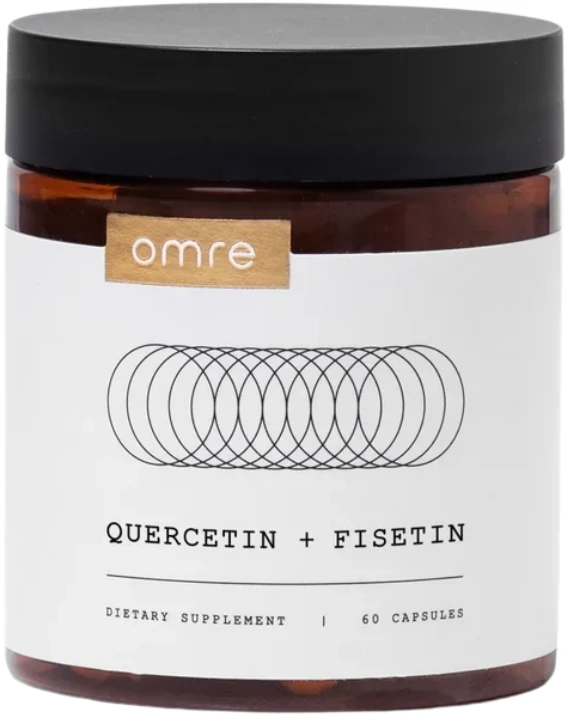 If you’re looking for a simple way to harness the combined power of these senolytic agents, products like Omre Quercetin + Fisetin provide an all-in-one solution.
If you’re looking for a simple way to harness the combined power of these senolytic agents, products like Omre Quercetin + Fisetin provide an all-in-one solution.
This supplement combines both ingredients into a single formula, offering you the benefits of both in one easy-to-take dose. It's an effective way to support your body with antioxidant-rich compounds without the need for multiple supplements.
For anyone interested in the potential longevity and anti-inflammatory effects of these ingredients, this combination could be an ideal addition to your health regimen.
Fisetin vs Quercetin: Which One Is Better?
Fisetin is better for clearing senescent cells and supporting healthy aging, while quercetin is more effective at reducing inflammation and supporting immune health.
The best choice depends on your personal health goals, but for many people, combining both may offer broader benefits.
Fisetin stands out for its senolytic power. It helps remove damaged, aging cells that build up over time and contribute to tissue breakdown and disease.
This makes it a popular option in anti-aging protocols, especially for brain health and long-term cellular function.
Quercetin, on the other hand, is a go-to for managing inflammation. It’s widely used for allergy relief, immune support, and cardiovascular health.
When taken together, fisetin and quercetin may work synergistically, helping your body fight aging from two angles: reducing harmful inflammation and clearing out worn-out cells.
Conclusion
Fisetin and Quercetin are both potent compounds with their own unique benefits. Fisetin tends to focus more on brain health and aging, while Quercetin is widely recognized for its immune and anti-inflammatory properties.
Deciding which one is better ultimately depends on your individual health goals.
If you're looking for a combination of both to maximize the antioxidant and anti-inflammatory effects, the Omre Quercetin + Fisetin supplement could be a convenient option.
Check availability to see how this blend can support your wellness journey.
FAQs
What is the difference between Fisetin and Quercetin?
Fisetin is known for its neuroprotective and anti-aging effects, while Quercetin is more commonly used for immune support and fighting inflammation. Both have antioxidant and potential anti-aging benefits.
Can I take Fisetin and Quercetin together?
Yes, taking Fisetin and Quercetin together is safe and may even enhance their individual benefits. Both compounds work synergistically to support overall cellular health, immune function, and longevity. They are both considered to have senolytic properties, meaning they may support the clearance of “zombie cells”. These are non-functioning cells that have persisted and not gone through appropriate programmed cell death.
How long does it take to feel the effects of Quercetin?
It may take a few days to a few weeks to notice the benefits of Quercetin, depending on your body and the reason for taking it. Regular use over time may help reduce inflammation and improve overall immune function
Is Quercetin safe to take daily?
Quercetin is generally safe for most people when taken at recommended doses. However, it's always a good idea to consult with a healthcare provider before starting any new supplement, especially if you have underlying health conditions or are taking other medications.




